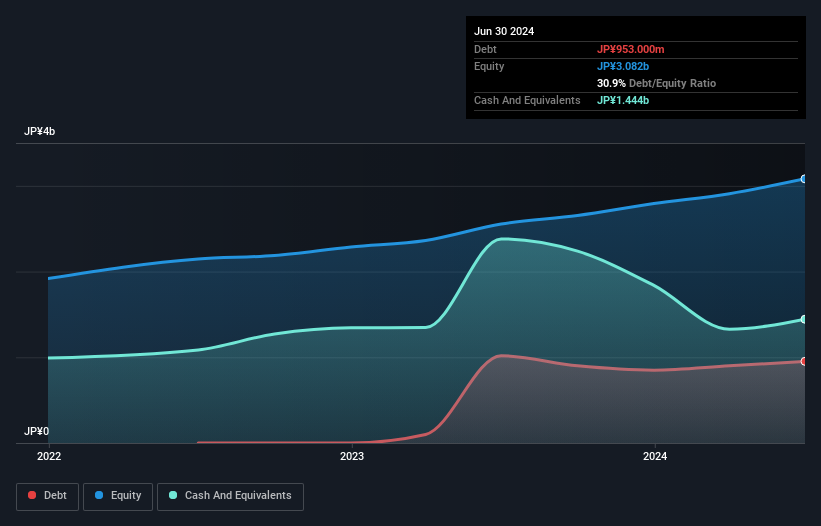Here's Why Power Solutions (TSE:4450) Can Manage Its Debt Responsibly
Warren Buffett famously said, 'Volatility is far from synonymous with risk.' When we think about how risky a company is, we always like to look at its use of debt, since debt overload can lead to ruin. Importantly, Power Solutions, Ltd. (TSE:4450) does carry debt. But should shareholders be worried about its use of debt?
When Is Debt A Problem?
Debt assists a business until the business has trouble paying it off, either with new capital or with free cash flow. In the worst case scenario, a company can go bankrupt if it cannot pay its creditors. However, a more usual (but still expensive) situation is where a company must dilute shareholders at a cheap share price simply to get debt under control. Of course, debt can be an important tool in businesses, particularly capital heavy businesses. When we examine debt levels, we first consider both cash and debt levels, together.
Check out our latest analysis for Power Solutions
What Is Power Solutions's Debt?
The image below, which you can click on for greater detail, shows that Power Solutions had debt of JP¥953.0m at the end of June 2024, a reduction from JP¥1.02b over a year. However, it does have JP¥1.44b in cash offsetting this, leading to net cash of JP¥491.0m.

A Look At Power Solutions' Liabilities
We can see from the most recent balance sheet that Power Solutions had liabilities of JP¥1.78b falling due within a year, and liabilities of JP¥639.0m due beyond that. Offsetting this, it had JP¥1.44b in cash and JP¥1.27b in receivables that were due within 12 months. So it can boast JP¥289.0m more liquid assets than total liabilities.
This short term liquidity is a sign that Power Solutions could probably pay off its debt with ease, as its balance sheet is far from stretched. Succinctly put, Power Solutions boasts net cash, so it's fair to say it does not have a heavy debt load!
On top of that, Power Solutions grew its EBIT by 36% over the last twelve months, and that growth will make it easier to handle its debt. When analysing debt levels, the balance sheet is the obvious place to start. But it is Power Solutions's earnings that will influence how the balance sheet holds up in the future. So when considering debt, it's definitely worth looking at the earnings trend. Click here for an interactive snapshot.
Finally, while the tax-man may adore accounting profits, lenders only accept cold hard cash. Power Solutions may have net cash on the balance sheet, but it is still interesting to look at how well the business converts its earnings before interest and tax (EBIT) to free cash flow, because that will influence both its need for, and its capacity to manage debt. Over the last three years, Power Solutions recorded negative free cash flow, in total. Debt is usually more expensive, and almost always more risky in the hands of a company with negative free cash flow. Shareholders ought to hope for an improvement.
Summing Up
While we empathize with investors who find debt concerning, you should keep in mind that Power Solutions has net cash of JP¥491.0m, as well as more liquid assets than liabilities. And we liked the look of last year's 36% year-on-year EBIT growth. So is Power Solutions's debt a risk? It doesn't seem so to us. There's no doubt that we learn most about debt from the balance sheet. But ultimately, every company can contain risks that exist outside of the balance sheet. We've identified 3 warning signs with Power Solutions (at least 1 which makes us a bit uncomfortable) , and understanding them should be part of your investment process.
When all is said and done, sometimes its easier to focus on companies that don't even need debt. Readers can access a list of growth stocks with zero net debt 100% free, right now.
New: Manage All Your Stock Portfolios in One Place
We've created the ultimate portfolio companion for stock investors, and it's free.
• Connect an unlimited number of Portfolios and see your total in one currency
• Be alerted to new Warning Signs or Risks via email or mobile
• Track the Fair Value of your stocks
Have feedback on this article? Concerned about the content? Get in touch with us directly. Alternatively, email editorial-team (at) simplywallst.com.
This article by Simply Wall St is general in nature. We provide commentary based on historical data and analyst forecasts only using an unbiased methodology and our articles are not intended to be financial advice. It does not constitute a recommendation to buy or sell any stock, and does not take account of your objectives, or your financial situation. We aim to bring you long-term focused analysis driven by fundamental data. Note that our analysis may not factor in the latest price-sensitive company announcements or qualitative material. Simply Wall St has no position in any stocks mentioned.
About TSE:4450
Solid track record with excellent balance sheet.
Market Insights
Community Narratives



